James Crabtree, author of The Billionaire Raj, delivers a speech on the BRI at CCG

With the increased international attention on the Belt and Road Initiative (BRI), a certain skepticism toward the initiative has emerged in some countries. On September 26, James Crabtree, author of The Billionaire Raj: A Journey Through India’s New Gilded Age and associate professor of Practice at the Lee Kuan Yew School of Public Policy, visited the Center of China and Globalization (CCG) in Beijing to deliver a speech titled “BRI’s Next 5 Years, Can the World Learn to Love China’s Mega Project?”
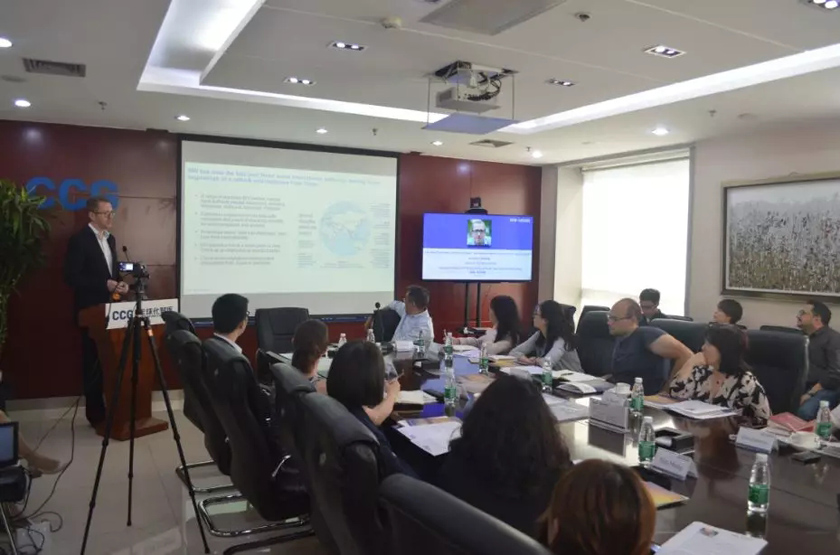
Crabtree also discussed with CCG Secretary-General Miao Lu, Senior Research Fellow Andy Mok, and other CCG experts and media representatives about the BRI’s current challenges and opportunities as well as its prospects for the future.
Western perspective on the BRI’s new vision
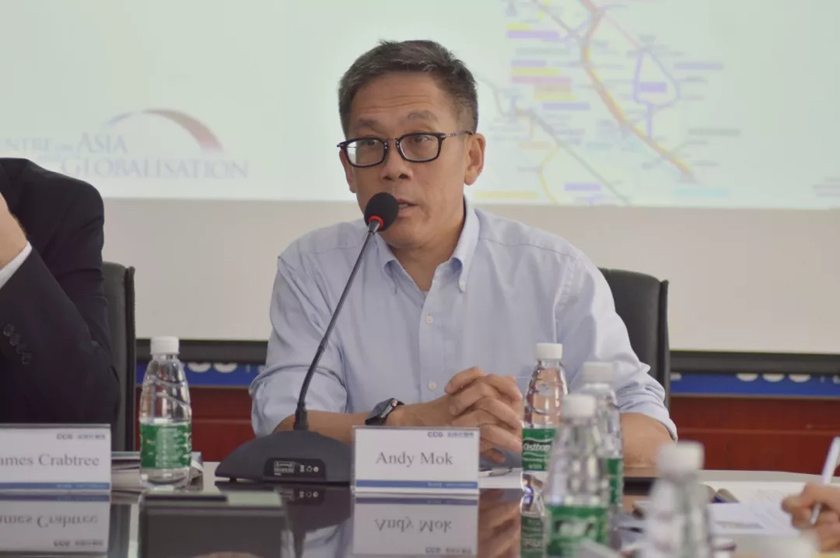
CCG Senior Research Fellow Andy Mok said that the experience of working in think tanks, being a professor and journalist has given James Crabtree a unique perspective on the international situation, which could promote communication and understanding regarding the BRI.
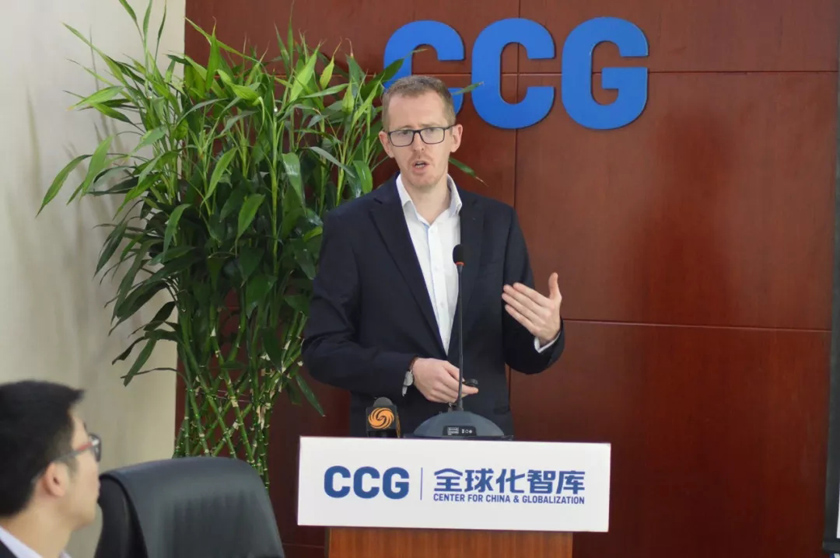
Crabtree said that he has followed the development of the BRI even before its launch. He also reported on the development of Hambantota in Sri Lanka in 2012 as a journalist. During the speech, Crabtree critically analyzed China’s vision for the BRI 2.0, the challenge of delivering China’s new vision and the BRI’s place in a changing Asian regional order from a western perspective.
The development of the BRI under the US-China trade war
Crabtree said the regional order in the Asia-Pacific has changed rapidly as the US-China strategic relationship undergoes major shifts. Since the Second World War, America has always been a great power in the world. Nonetheless, China’s increasing economic power makes it have the largest trade partner of almost all Asian countries. This has brought many Asian countries to rebalance ties between China and America.
Crabtree pointed out that the coming era is going to be dominated by competition across a range of domains. The US-China trade war is the earliest manifestation of the upcoming era of strategic competition. Although China is chasing in many aspects, the US remains by most measures the leading power in Asia.
He noted that Southeast Asia and East Asia are going to be the focus of future global competition in this century.
Crabtree also noted that the BRI faced some challenges last year, which made China rethink and respond to related issues. The Second Belt and Road Forum for International Cooperation was a key attempt to recalibrate and support China’s signature foreign policy initiative. Crabtree also added that Western countries remain unclear about the best way to understand the BRI even after five years.
BRI infrastructure investment needs adjustment under the new vision
Crabtree said that the BRI is a useful illustration of the challenges China faces as its regional influence expands. The BRI’s development in Myanmar shows the problems and challenges of delivering the new vision of the BRI.
BRI infrastructure investment could have many positive impacts. If completed, BRI transport projects could boost trade by 3% to 10% in BRI corridors and 2% to 6% globally.
However, Crabtree also suggested there could be improvements regarding trade facilitation, transparency and governance. Moreover, the BRI’s multilateral development led by the Asian Infrastructure Investment Bank (AIIB) lacks implementing details. A formal secretariat, a more formal structure and clearer procurement rules may help the BRI to advance.
Certain investment challenges create difficulties in developing the BRI’s economy. These challenges include decreasing the value of China’s foreign investment and construction contracts and declining current account surplus. Thus, Crabtree suggested China consider how to improve delivery of the new vision of the BRI.
The BRI’s place in a changing Asian regional order
Crabtree said that nations around Asia are responding to China’s emerging power, leading to a new era of balancing between Beijing and Washington.
The BRI has prompted responses toward China’s growing role, but those responses have been poorly coordinated so far. On the other hand, America’s long-term system of regional alliances is waning, though America is still a great power. The complexities of Asian dynamic regional relations shows itself in relations between America and India. The US, India and other western countries often tend to view the BRI through the lenses of security and strategic competition.
Crabtree pointed out that strategic competition between China and America would limit the function of extant multilateral institutions. He said that the new regional order would be fragmented in the post-American period. But that it also provides some policy space for middle-ranking powers to develop independent relations.
Crabtree noted that the success of the AIIB gains its reputation because of transparency and high standards. It also shows China’s ability to launch and build a new regional institution, while the completion of the Comprehensive and Progressive Agreement for Trans-Pacific Partnership (CPTPP) shows that US leadership is no longer required to build new regional trade architecture.
Promoting the BRI in Europe
During the discussion, Crabtree, CCG experts and media representatives explored how European countries view the BRI and cooperate with China, as well as the BRI’s influence on soft power through talent exchange, and the prospects for cooperation under the BRI between Asian countries and China.
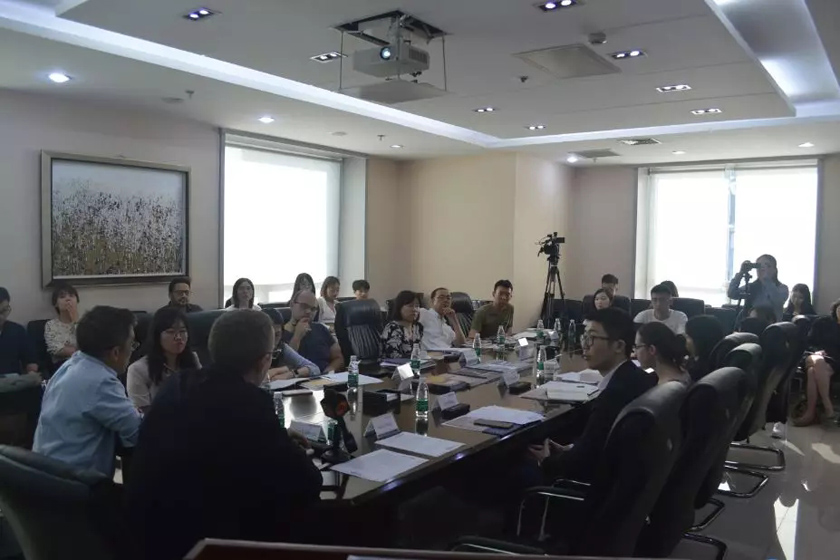
Crabtree responded that some problems have emerged after BRI agreements have been signed in Europe. Improved understanding would help to promote the BRI in Europe.
He noted that talent exchange can advance a nations’ soft power in areas like technology and culture. Competition on infrastructure investment has intensified under the US-China trade war, which may cause more problems, such as lower quality of infrastructure.
CCG, one of China’s leading non-governmental think tanks, focuses on the study about globalization, international relations, the multilateral cooperation under the BRI and global development. It offers an international platform for multilateral trade cooperation and global free trade system. CCG holds seminars about economic cooperation between China and western countries and Asian regional development. It provides new insights and new thoughts on the BRI’s stable development and for cultural communication between China and the West.
About Speaker
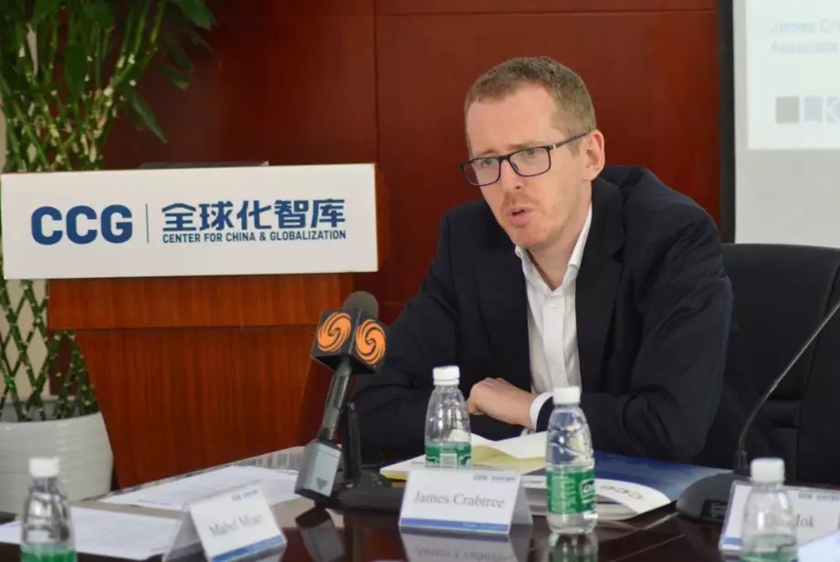
James Crabtree is an associate professor of practice at the Lee Kuan Yew School of Public Policy. He wrote the best-selling book The Billionaire Raj: A Journey Through India’s New Gilded Age. Crabtree was a senior policy advisor in the UK Prime Minister’s Strategy Unit under Prime Ministers Tony Blair and Gordon Brown. He worked for several American and British think tanks and was a Fulbright Scholar at Harvard’s Kennedy School of Government.





